#Alec Karakatsanis
Text
Copaganda does three main things.
First, it narrows our understanding of safety. Police get us to focus on crimes committed by the poorest, most vulnerable people in our society and not on bigger threats to our safety caused by people with wealth and power.
For example, wage theft by employers dwarfs all other property crime combined — from burglaries, to retail theft, to robberies — costing some $50 billion every year. Tax evasion steals about $1 trillion each year. There are hundreds of thousands of Clean Water Act violations each year, causing cancer, kidney failure, rotting teeth, and damage to the nervous system. Over 100,000 people in the United States die every year from air pollution, five times the number of all homicides.
But through the stories cops feed reporters, the public is encouraged to measure a city’s safety by whether it saw an annual increase or decrease of three homicides or fourteen robberies — rather than by how many people died from lack of access to health care, how many children suffered lead poisoning, how many families were rendered homeless by illegal eviction or foreclosure, or how many thousands of illegal assaults police committed.
The second function of copaganda is to manufacture crises or “crime surges.” For example, if you watch the news, you’ve probably been bombarded with stories about the rise of retail theft. Yet the actual data shows there has been no significant increase. Instead, corporate retailers, police, and PR firms fabricated talking points and fed them to the media. The same is true of what the FBI categorizes as “violent crime.” All told, major “index crimes” tracked by the FBI are at nearly forty-year lows.
The third and most pernicious function of copaganda is to manipulate our understanding of what solutions actually work to make us safer. A primary goal of copaganda is to convince the public to spend even more money on police and prisons. If safety is defined by street crime, and street crime is dangerously high, then funding the carceral state leaps out to many people as a natural solution.
The evidence shows otherwise.
— Alec Karakatsanis, “Police Departments Spend Vast Sums of Money Creating “Copaganda”” | Jacobin, July 2022
24K notes
·
View notes
Video
https://twitter.com/equalityAlec
https://civilrightscorps.org/alec-karakatsanis-founder-executive-director/
#Tiktok#Alec Karakatsanis#true crime#Crime#wage theft#copoganda#police violence#police brutality#police abolition
12 notes
·
View notes
Link
1 note
·
View note
Text
Coverage of Escaped Prisoner is More Proof that Mainstream "Liberal" Media is All About Entertainment & Propaganda
A family member regularly watches CNN, so I hear snippets. For weeks now, a frequent news item has been Danelo Cavalcante’s escape from a jail in Pennsylvania and the attempts by law enforcement to apprehend him.
Screenshot of results from search of CNN.com, 2023-Sep-13
Aside from the danger the prisoner poses to his targets, what is the purpose of a national news outlet covering this story?…

View On WordPress
1 note
·
View note
Text
the latest from Alec's copaganda newsletter is a must-read.
0 notes
Text
The National Retail Federation (NRF) — the top lobbying group for retail corporations in Washington, DC — recently admitted that its data about "organized retail crime" causing huge losses was significantly off base.
In 2021, the group initially stated that out of the approximately $94.5 billion in store merchandise losses that year, roughly half was attributed to "organized" shoplifting campaigns. NRF head of asset protection and retail operations David Johnston told CNN in November that retail chains were "seeing unprecedented levels of theft coupled with rampant crime in their stores, and the situation is only becoming more dire."
However, the New York Times reported Friday that the NRF's figure of 50% of losses attributed to organized shoplifting was actually closer to 5%.
"It would be a bit like the census claiming that nearly half of the U.S. population lives in the state of Rhode Island," Trevor Wagener, the chief economist at the Computer & Communications Industry Association, told the Times.
Retailers themselves admitted that they overestimated losses to shoplifting. In January of 2022, drugstore chain Walgreens said its closure of five stores in the San Francisco area in 2021 was due to a spike in organized shoplifting. But then-Chief Financial Officer James Kehoe said in January of 2023 that its shrink rate (losses attributed to shoplifting, theft and fraud) was just 2.5% in the first fourth quarter.
"Maybe we cried too much last year," Kehoe said.
Civil rights attorney and media critic Alec Karakatsanis told the Times that media outlets failed to critically examine retailers' claims about shoplifting, and were "used as a tool by certain vested interests to gin up a lot of fear about this issue."
"In fact, it was pretty clear all along that the facts didn’t add up," Karakatsanis said.
Karakatsanis asserted that retail chains used the media panic over organized shoplifting — in which groups of shoppers allegedly steal items from brick-and-mortar stores and sell items online for higher prices — to lobby for tighter regulations on their competitors in the e-commerce industry.
The panic resulted in concrete policy changes from lawmakers on both sides of the aisle. Californa Governor Gavin Newsom (D) called for stricter prosecution of shoplifters in 2021, and Florida Governor Ron DeSantis (R) signed a bill into law that same year imposing stricter penalties on retail theft.
53 notes
·
View notes
Text
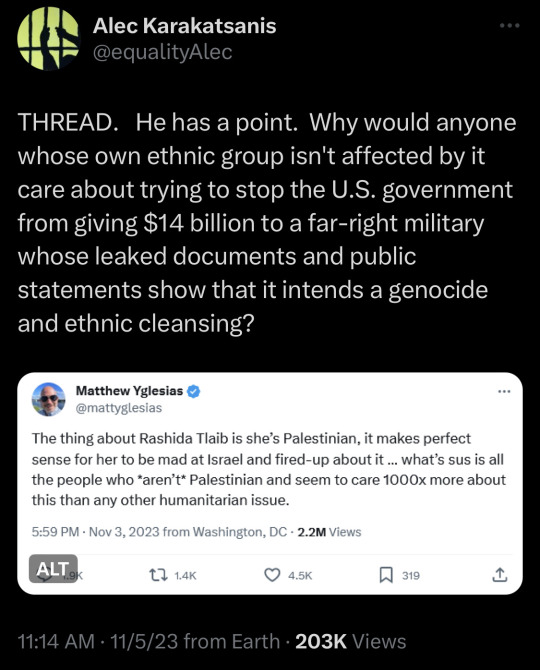



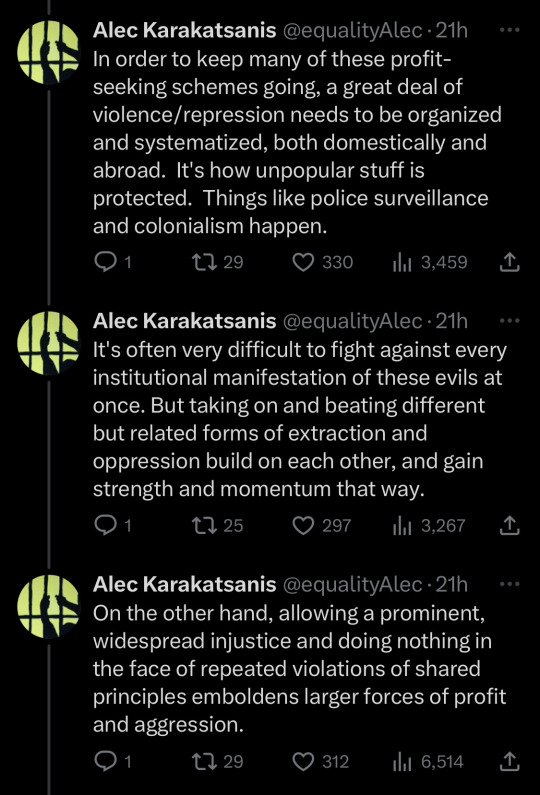

Alec Karakatsanis on solidarity connecting other fights to Palestine
28 notes
·
View notes
Text
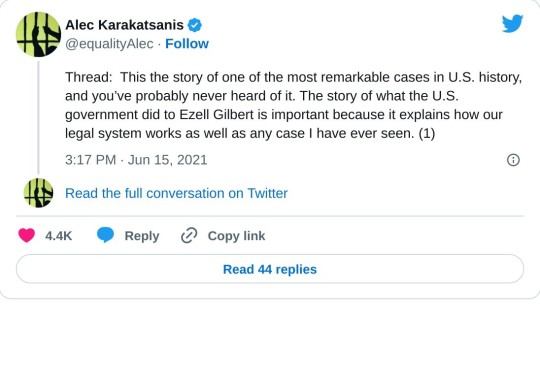
View on Twitter
Thread by Alec Karakatsanis from June 15, 2021:
This the story of one of the most remarkable cases in U.S. history, and you’ve probably never heard of it. The story of what the U.S. government did to Ezell Gilbert is important because it explains how our legal system works as well as any case I have ever seen.
In 1997, Ezell Gilbert was sentenced to more than 24 years in federal prison in a crack cocaine case. Because of mandatory sentencing (treating crack 100 times as severely as powder), he was put in a cage for a quarter century, and even the judge said this was too harsh.
At sentencing, Gilbert saw an error that increased his sentence by about **ten years** based on a misclassification of a prior conviction. In 1999, without a lawyer, he filed a petition complaining about the mistake. The Clinton DOJ opposed him, and a court ruled against him.
Ten years later, the Supreme Court issued a ruling in another person’s case, confirming that Gilbert had been correct about the error in his case. A public defender helped him file a new petition for immediate release from prison back to his family. He had served his time.
But Obama/Holder DOJ argued to a federal judge that even if his sentence was illegal, Gilbert must remain in prison. They said the “finality” of criminal cases was too important to allow prisoners to file more than one petition, even if the first one was wrongly denied.
The federal judge sided with Obama/Holder, and Ezell Gilbert remained in a cage even though everyone agreed he was now in prison illegally. He had the audacity to hope that courts would follow the law.
A federal appeals court disagreed with Obama/Holder, and in June 2010, three judges set Gilbert free after more than 14 years in prison.
The judges rejected the DOJ’s argument as a departure from fairness and common sense. They said that it could not be the law in the U.S. that a person had to serve a prison sentence that everyone admitted was illegal. Ezell Gilbert went home and stayed out of trouble.
Here’s where it gets interesting. There are many people like Gilbert in federal prison whose sentences are illegal. Did you know that? Instead of rushing to ensure that thousands of people illegally separated from their families were set free, DOJ decided to fight and appeal.
The Obama/Holder DOJ argued: If prisoners were allowed to file more petitions, the “floodgates” would open and many others — mostly poor, mostly Black — would have to be released. They asked a larger group of judges to reverse Gilbert’s victory.
In 2011, a larger group of judges, led by a Republican majority, agreed with Obama/Holder that the “finality” of sentences was too important to allow prisoners to be released on a second rather than first petition, even if the prisoner was correct all along.
Ezell Gilbert was rearrested and sent back to prison to serve out his illegal sentence in a cage.
media.ca11.uscourts.gov/opinions/pub/f…
An 87-year-old Republican judge wrote a dissent. Having served in WWII, he called the explicit decision to illegally keep a human being in jail “shocking.” He wrote that a “judicial system that values finality over justice is morally bankrupt.”
Addressing Obama/Holder argument directly, he said: “[T]here are many others in Gilbert’s position — sitting in prison serving sentences that were illegally imposed. We used to call such systems ‘gulags.’ Now, apparently, we call them the United States.”
Major media ignored Ezell Gilbert’s case at the time.
In 2013, two years after sending him back to a cage, Obama granted Gilbert clemency, and the media praised Obama for his leniency. Tens of thousands of other human being remained in prison illegally. You’ve never heard their names.
(end thread)
#haven't found any tumblr posts about this yet and i know it's an old thread but holy shit#ezell gilbert#incarceration#prison industrial complex#war on drugs#antiblack racism#racism#criminalization#prison#prison abolition#private prisons#sentencing inequality#us politics#politics
68 notes
·
View notes
Quote
My grandparents dealt with antisemitism for their entire lives. Weaponizing "antisemitism" to insulate a monstrous anti-democratic government and fascist vigilante settler violence from measured criticism and application of basic international law cheapens the concept.
(2) Alec Karakatsanis on X: "THREAD. Something must be said about today’s irresponsible New York Times article about antisemitism. I can’t believe it was published." / X
0 notes
Text
In Re Humphrey: The Recent California Decision and its Monumental Effect on Affordable Bail
By Avery Redula, University of California Davis Class of 2026
September 2, 2023

Imagine this: you are a single, unemployed mother of a young child who has just been detained and accused of possession of a controlled substance. You are unable to pay a bail of $300, and you were forced to be away from your child for three weeks already, simply due to your current financial circumstances. The judge gives you two options: plead guilty and go on record of confessing to the illegal possession of marijuana (which was not even yours, but was the property of the friend whose car you were in) or contest the charges and obtain a lawyer, dragging out the battle in court, with the next court date sent a month in advance.
This was a true scenario that Alec Karakatsanis of Equal Justice Under Law witnessed, which he discussed in his conference regarding Pretrial Justice. When given her two options by the judge this woman stated, “Tell me what to do and what to say.”. She subsequently plead guilty, was forced to pay a large fine in order to get back to her child. [2] This most likely crippled her already poor financial status, but as mothers always do, she put her child first.
This sort of pretrial injustice was common all across the United States before the 2021 Humphrey Decision. [3] Within their article titled “US: California Bail System Penalizes the Poor”, Human Rights Watch (HRW) details that almost half of the over 1.45 million people arrested in California that were put in jail were found not guilty, never had their cases filed, or had their cases dismissed. HRW states that, “California’s median bail rates are five times that of the rest of the nation. As a result, poor and middle-income people incur crippling debt when they pay a bondsman’s fee…” [4]
When setting bail amounts, the court determines if it should make an unreasonable amount for the defendant based on their threat to public safety, possible victim safety, and if there is any reason to believe they would be a flight risk. [5] However, as previously discussed, even for misdemeanor crimes such as possession of an illegal substance, individuals could be held in jail for extended periods of time without a conviction simply due to being poor.
Thankfully, there have been some recent changes put into place to protect indigent populations in California. In Re Humphrey, decided by the California Supreme Court, challenges this long standing injustice. Kenneth Humphrey was arrested for misdemeanor theft, first degree residential robbery, and inflicting injury on his fellow Senior care facility member. He additionally had other previous charges of robbery and attempted robbery. [6] In reality Humphrey had demanded money from the victim and obtained a bottle of cologne and a total of… $7. The court set a bail amount of $600,000 that was reduced to $350,000, with prosecution citing his previous charges that made him a flight risk. [7]
Kenneth Humphrey was 63 years old at the time of his hearing, and as previously mentioned, lives in a senior care facility with no new incoming financial support. A $350,000 bail was set for a total of $7 stolen, for an elderly man who clearly could not afford to post bail and needs home care assistance would then be forced to wait in prison, pre conviction.
Thankfully, the California Court of Appeal reversed the bail amount due to violations of the 14th amendment of the Constitution’s due process and equal protection clauses. The due process clause was violated due to Humphrey being deprived of his freedom without being convicted of a crime simply due to being indigent. The equal protection clause is in violation of this case, and cases like that of the single mother previously discussed, as it directly discriminates against those of lower economic status. [8]
In Re Humphrey is monumental in setting precedent for how the court operates around indigent pretrial detention and bail. There is now further vetting and specification on what is to be considered enough public danger or flight risk to set an unreasonable bail amount. Additionally, the court must consider an amount that will not only guarantee the state’s interest in having the accused go to trial but weigh in on the accused’s own financial circumstances. [9] It also releases pressure on the California jail system on overcrowding, as indigents who pose no risk to society would not be detained.
In a nation that prioritizes freedom and equality for all and an impartial court system, no person like Kenneth Humphrey or the single mother accused of possession should face jail time before a conviction, heavy fee burdens, loss of property, and time spent away from loved ones simply for being of poorer income. The Humphrey decision is a definite positive precedent set in the California state court system that protects those accused of crimes that were previously unable to protect themselves.
______________________________________________________________
Avery Redula is a second-year student at the University of California, Davis. She is majoring in English in hopes of pursuing criminal justice in the legal field as an attorney.
______________________________________________________________
[1] Photo credited to San Francisco Public Defender / March 25, 2021
[2] ABA Criminal Justice Section. “Alec Karakatsanis on Pretrial Justice”. 25 August 2016. Web 1 Sept. 2023. https://www.youtube.com/watch?v=VF7pZMTNohw
[3] San Francisco City and County Superior Court. “In re KENNETH HUMPHREY” 25 March 2021. Web 1 Sept. 2023. https://www.courts.ca.gov/opinions/archive/S247278.PDF
[4] “US: California Bail System Penalizes the Poor”. Human Rights Watch. 11 April 2017. Web 1 Sept. 2023. https://www.hrw.org/news/2017/04/11/us-california-bail-system-penalizes-poor
[5] Volume 135 Issue 3 “In re Humphrey: California Supreme Court Holds Detention Solely Because of Inability to Pay Bail Unconstitutional”. Harvard Law Review. 10 January 2022. Web 1 Sept. 2023. https://harvardlawreview.org/print/vol-135/in-re-humphrey/#footnote-ref-18
[6] San Francisco City and County Superior Court. “In re KENNETH HUMPHREY”
[7] Volume 135 Issue 3 “In re Humphrey: California Supreme Court Holds Detention Solely Because of Inability to Pay Bail Unconstitutional”. Harvard Law Review.
[8] Cornell Law School. “14th Amendment”. Legal Information Institute. Web. 1 Sept. 2023. https://www.law.cornell.edu/constitution/amendmentxiv
[9] Nicholas Cotter & David A. Kaiser. “Opinion Analysis: In re Humphrey (S247278)”. SCOCA blog. 7 June 2021. Web. 1 Sept. 2023. https://scocablog.com/opinion-analysis-in-re-humphrey-s247278/#:~:text=Humphrey%20unanimously%20held%20that%20it,the%20arrestee's%20appearance%20in%20court.
0 notes
Text
Over the past year or two, the news has been full of horror stories about shoplifting. To hear some people tell it, you’d think petty theft was a crisis of apocalyptic proportions. In the New York Post, for instance, we read that shoplifting is an “epidemic taking over America.” The Financial Times issues dire warnings of “surging shopping crime,” while Fox News insists that “the shoplifting crisis is a nightmare.” ABC’s Nightline airs scary-looking footage of what its hosts call “brazen smash-and-grabs”: people in masks breaking store windows, grabbing armloads of clothing, and running off. In the opinion pages of the New York Times, Pamela Paul waxes poetic over “What We Lose to Shoplifting.” (The loss in question? Paul herself feels less comfortable in stores these days. Riveting stuff.)
In response to this supposed scourge, there’s been a resurgence in “tough-on-crime” tactics, both from corporations and political leaders. In department stores like Target, customers are confronted by elaborate new security measures, with everything from toothpaste to frozen pizza locked behind glass. Rite Aid pharmacies have turned to facial-recognition software to guard their merchandise, only to discover that their computers falsely identify people as “likely shoplifters”—particularly if those people have dark skin. In New York City, Mayor Eric Adams has launched an entire police task force dedicated to retail theft. And on the campaign trail, Donald Trump has called for more violent measures, saying that police should simply shoot shoplifters on sight.
But statistical data shows that the reports of a shoplifting “epidemic” are highly exaggerated, if not outright made up. In a recent report, the Council on Criminal Justice gathered data about retail theft from 24 different U.S. cities, examining the frequency of reports, the dollar value of items stolen, the number of people involved in each crime, and several other factors. At first glance, it did appear that shoplifting was on the rise in the first half of 2023, as it increased by 16 percent compared to pre-pandemic levels. However, as German Lopez notes in the New York Times, that figure was heavily skewed by data from New York City. Remove the Big Apple, and the numbers tell a different story: shoplifting has actually decreased in 17 of the 24 cities surveyed, and is now fairly rare, with just 38.6 reported incidents per 100,000 people. In June 2019, that number was 45.1. Shoplifting might be happening more often in New York City specifically, but an “epidemic taking over America,” it isn’t.

[...] As author and civil rights lawyer Alec Karakatsanis points out, there’s also a strong class element involved in what kinds of behaviors are deemed newsworthy to begin with:
When the daily news media reports on a “crime wave” or a “surge in shoplifting” nearly every time the numbers from the police department fluctuate upward (note that no similar metaphors are used for decreases), they are almost always using these terms to describe the collective behavior of poor people and other marginalized groups. Things rich people do don’t often get this same metaphoric treatment in daily news. How many times do you see a major news story on a “surge” in tax evasion (a problem over 60 times the magnitude of other reported property crimes) or a “wave of crime” by oil companies?
[article by Alex Skopic, January 2024, keep reading]
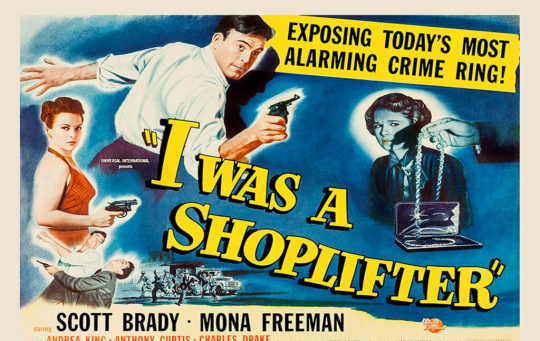
31 notes
·
View notes
Text
on how the media covers “crime”
Assembling a Crime Wave
Alec Karakatsanis (May 2023)
how focused many professional class elites are, at any given moment, on their belief that there is some sort of “crime wave” happening. Professional elites are routinely in a state of panic about crime. (By this I mean a narrow range of crimes for which police arrest mostly poor people.)
Professional elites rarely experience a moral panic or subjective feeling of a “crime wave” or “surge” about crimes like wage theft, water pollution, foreclosure fraud, tax evasion, air pollution, building safety code violations, prison guard brutality, illegal police spying, political corruption, sexual assault of migrant detainees, or other crimes that are rampant and cause objectively higher levels of harm. They seem only to obsess urgently about some crimes committed by some people, and this obsession is usually not correlated with any objective assessment of overall threat to well-being. I have written about how the criminal punishment bureaucracy largely ignores the crimes of powerful people while ruthlessly and selectively targeting poor and marginalized people, and I have written many times in this newsletter with a wide range of examples about how media coverage of crime distorts what we see as urgent.
Citations Needed podcast: Local Crime Reporting as Racist Police Stenography (2019 I think)
"The suspect fled on foot, police said. Call this number if you have any information." "The incident took place at the 1200 block of Grove." "Police say." "Police sources are telling us." "Suspect is thought to be armed and dangerous."
We’ve all heard this type of Official Copspeak before. The local press dutifully informs us about "suspects" and "gang members" and "burglars." They're infiltrating our neighborhoods, rampaging through our streets, climbing in our windows. The police, of course, are just doing their part to keep us safe. Local media and community-based message boards they pander to read like police blotters. "Dial 1-800-985-TIPS for your friendly neighborhood detective!"
But what if publishing police department press releases isn't really journalism, but rather free public relations for an already extremely powerful, routinely violent, often corrupt and deeply conflicted institution? What if the genre of so-called “crime’ reporting is inherently reactionary and the whole enterprise of how we think about “crime” needs to be deconstructed and reconsidered?
On this week’s episode, we discuss why local "crime" reporting widely suffers from racist tabloidism and what overworked and under-resourced journalists can do to gather information from sources that don't wear badges.
We are joined by Chicago-based activists Sharlyn Grace and Malcolm London.
0 notes
Text
Walgreens Executive Says Shoplifting Threat Was Overstated
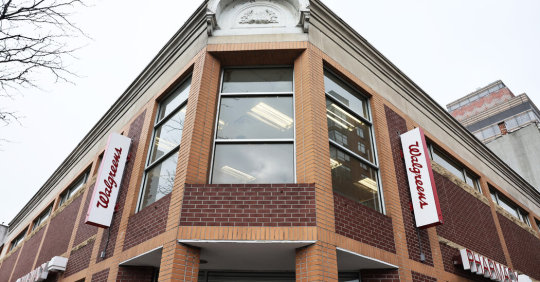
Some of the biggest corporations have expressed concern about the impact of theft at the point of sale on profits.
Walmart's chief executive officer, Doug McMillon, told CNBC in December that an increase in shoplifting might cause the company to shut down stores. Then, in November The chief financial director, Michael Fiddelke, said the shrinkage of Target's business had cut its profit margin by nearly $400 million by 2022. Mr. Fiddelke was not able to say the extent of the shrinkage was due to shoplifting.
Alec Karakatsanis, the founder and executive director of Civil Rights Corps, a non-profit that promotes reforms in the criminal justice system, said the allegations made by Mr. Kehoe's detour revealed the reasons why the general public, and the media, in general, need to be more skeptical of corporate statements regarding criminality.
"I think unfortunately across the United States, the reporting on this issue really lacked this kind of skepticism for a long time," Mr. Karakatsanis said.
Inventory shrinkage over the past five years averaged 1.5 percent in the report of the National Retail Foundation, who surveyed more than 63 retailers between May between June 2022 and May. The study found that by 2021, 37 percent of shrinkage resulted due to theft from outside and 28 percent due to internal theft.
The majority of companies that were surveyed stated that external theft has become more of a concern over the past five years, and so did warnings of violent acts. The companies that were surveyed stated that the most significant threat that had increased the fastest in 2021 was violence perpetrated by employees against customers.
Hung-Chung Su who is who is an assistant professor in operations management at University of Michigan, Dearborn, stated that even though Ms. Kehoe spoke positively about the decline of thefts, 2.5 percent shrinkage is still a challenge for the business.
According to Dr. Su's findings, retailers depend too heavily on technology to protect themselves from theft.
"If you really want to reduce retail shrinkage or retail theft, it ultimately comes down to the employees," Dr. Su said. "But during the time of the pandemic the turnover of employees at retailers increased. The employees found better work with higher pay."
Read the full article
1 note
·
View note
Quote
And now, during what punishment bureaucrats call the 'war on drugs,' punishment bureaucrats make a choice to 'fight' drug use (when it comes to *some* drugs when used in *some* neighborhoods) not as a public health issue, but through armed agents and cages. No matter what one's views on drugs, there is one thing that all agree on: these laws were *never* based on empirical evidence about the best way to create a society with less use of harmful substances.
Why does the evidence matter so little to the punishment bureaucracy? The punishment system would change overnight if the vast numbers of young, wealthy, and white drug criminals at private schools and famous universities were harassed and beaten by police in the streets, had their family homes raided at night, were sexually and physically assaulted in prisons, and were confined to live and die in cages. The human costs of the bureaucracy would be evaluated differently if drug searches by undercover police and SWAT teams were as common at Yale University as they are down the street in the low-income neighborhoods of New Haven. The brutality of separating tens of millions of families from their loved ones -- with no empirical evidence of a benefit -- would not be tolerated if it were happening to different people. Our culture would see it as widespread violence in need of serious justification, if not a human rights crisis demanding urgent and immediate action, rather than as a vague and impersonal aspect of the need for 'law enforcement.'
And so the knowledge that laws will be enforced in particular ways against particular people changes what laws powerful people create. Elites need not worry about creating crimes with harsh punishments if they know that the laws will not be enforced against them.
Usual Cruelty: The Complicity of Lawyers in the Criminal Justice System by Alec Karakatsanis
“Punishment bureaucrats” is my new favorite term.
Also, this book makes me so fucking angry. Which I’m sure was his point. There is so much that the elite do under the guise of law. I’m literally on page 23 of this book and have sworn at it so many times.
Didja know that until recently, lawmakers in DC could engage in insider trading without repercussion? NEITHER DID I.
4 notes
·
View notes
Link
1 note
·
View note